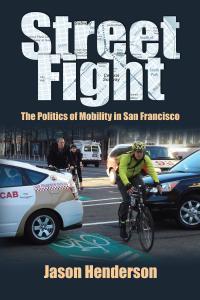[Ed Note: SF State Professor Jason Henderson, whose work we’ve covered for years, wrote this op-ed for the New York Times and customized this version for us]
A few weeks ago Wall Street Journal editorial board member Dorothy Rabinowitz inflamed the contentious street fight over urban cycling in America. Decrying bicyclists as an all-powerful enterprise and New York’s Mayor Bloomberg as an autocratic ideologue, her immediate target was the new bike share program rolled out in New York City in late May.
For San Franciscans familiar with bicycle politics, Rabinowitz’s charges are nothing new and invoke a long tradition of anti-bicycling rhetoric from the right, even in the Bay Area. Over the last fifteen years working as a transportation scholar, I have heard conservative politicians and pundits from Atlanta to San Francisco charge bicycle advocates of having dangerous political intentions and dismiss urban cyclists and their concerns.
But if there is one thing about Rabinowitz’s rant that was compelling, it was her suggestion that bicycling can be ideological. She’s right, although somewhat misdirected in explaining her point. Perhaps we can use Rabinowitz’s grand intervention into this ongoing discussion as an opportunity to consider and deconstruct the ideologies behind urban cycling debates. It’s worth considering, because ideology does matter in the politics of urban mobility.
For example, policies supporting bicycling come from all kinds of folks, and sometimes lead to strange ideological bedfellows that merge the interests of real estate with more progressive, green viewpoints. In the last decade real estate interests in cities from New York to San Francisco, from Atlanta to Chicago, have embraced bicycling as a key part of economic development. From an entrepreneurial angle, a successful city is one that has a youthful, fit, “creative class” that can chose to bicycle. Ideologically, this is the “neoliberal” stance, wherein access to bikeable streets is also useful for marketing the city. New York’s Citi-Bike is a great example: the bikes are draped in corporate logos and yet make dense urban space more functional and attractive for investment. And if you have a Citibank credit card, you can get a discount.
This neoliberal, market-oriented bicycle politics is very different from the last forty years of progressive bicycle advocacy in San Francisco and around the United States. Progressive bicycle advocacy is steeped in an ethos stressing that social responsibility requires less driving and more attention to how one moves around cities. It is not about marketing real estate, or banks. Progressives see bicycling as part of the solution to global warming, reducing oil consumption (and averting the need for the Keystone Pipeline) and a myriad other environmental and social problems. A progressive framework conceptualizes mobility as a systemic problem that requires deep social commitment and responsibility. How we get there matters. It posits that there can be too much mobility, as exemplified by high levels of driving in our cities, and that excessive mobility results in both environmental degradation and major social inequality at a local, national, and global scale.
The conflation of a neoliberal politics of bicycling with a progressive politics of bicycling contributes to a confusing conservative backlash against cycling. The pronounced conservative discourse vehemently opposes re-allocating street space toward other modes like bicycling or public transit (progressive policies) and also invokes a populist outcry that car drivers are victims of schemes to price gouge them and make driving more expensive for all but the wealthy and chauffeured (neoliberal policies). Instead conservatives advocate that new development in cities should have abundant and inexpensive parking for automobiles and that government should preserve easy and inexpensive automobile access throughout cities – even in Manhattan and San Francisco. Conservatives balk at creating cycle tracks by removing car space on city streets, and when bikeways are implemented conservative activists protest that the “bike lobby” (a term Rabinowitz used, resulting in a rather hilarious Twitter handle, @bicyclelobby) controls city hall – when in the case of New York AND San Francisco, it’s actually neoliberals.
At the national level, Rabinowitz’s conservative claims of an all-powerful bicycle enterprise and totalitarianism speaks to the broader conspiratorial anti-Agenda 21 screed often heard from Glen Beck, Tea Party activists and Republican allies. Drafted in the early 1990’s, Agenda 21 was an innocuous set of United Nations recommendations for environmental sustainability, but right wing activists have twisted it to suggest that efforts to provide public transit, encourage bicycling, and build communities that are walkable are part of some sort of grand plot to overthrow America. This kind of backlash rhetoric dangerously resonates with a not-insubstantial portion of the electorate. In San Francisco we’ve heard conspiratorial rants in dozens of public meetings about the proposed “Plan Bay Area” – so much that planners have diluted the plan such that 80% of all future trips will still be in cars and there’s no real ambition for bicycling or transit-oriented development that reduces driving. The fear-mongering on the right has worked and now progressive San Franciscans are asking if Plan Bay Area is worth it.
Ironically, conservatives preach unfettered markets and entrepreneurialism, which is what CitiBank and New York’s mayor are doing in their neoliberal bicycling strategy. Yet Rabinowitz and her local and national conservative anti-bicycling cohort are lashing out at bicycling and conflating neoliberal politics with the progressive hue. Perhaps we can start to disentangle this and move forward when we look more closely at the ideologies in the urban mobility debate.
Jason Henderson is Associate Professor of Geography at San Francisco State University, and author of Street Fight: The Politics of Mobility in San Francisco (U Mass Press, April 2013)

